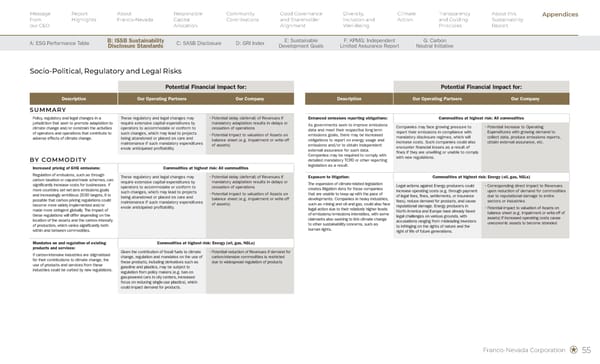Franco-Nevada Corporation 55 Socio-Political, Regulatory and Legal Risks Potential Financial Impact for: Description Our Operating Partners Our Company SUMMARY Policy, regulatory and legal changes in a jurisdiction that seek to promote adaptation to climate change and/or constrain the activities of operators and operations that contribute to adverse effects of climate change. These regulatory and legal changes may require extensive capital expenditures by operators to accommodate or conform to such changes, which may lead to projects being abandoned or placed on care and maintenance if such mandatory expenditures erode anticipated profitability. • Potential delay (deferral) of Revenues if mandatory adaptation results in delays or cessation of operations • Potential impact to valuation of Assets on balance sheet (e.g. impairment or write-off of assets) BY COMMODITY Increased pricing of GHG emissions: Regulation of emissions, such as through carbon taxation or cap-and-trade schemes, can significantly increase costs for businesses. If more countries set net-zero emissions goals and increasingly ambitious 2030 targets, it is possible that carbon pricing regulations could become more widely implemented and/or made more stringent globally. The impact of these regulations will differ depending on the location of the assets and the carbon intensity of production, which varies significantly both within and between commodities. Commodities at highest risk: All commodities These regulatory and legal changes may require extensive capital expenditures by operators to accommodate or conform to such changes, which may lead to projects being abandoned or placed on care and maintenance if such mandatory expenditures erode anticipated profitability. • Potential delay (deferral) of Revenues if mandatory adaptation results in delays or cessation of operations • Potential impact to valuation of Assets on balance sheet (e.g. impairment or write-off of assets) Mandates on and regulation of existing products and services: If carbon-intensive industries are stigmatised for their contributions to climate change, the use of products and services from these industries could be curbed by new regulations. Commodities at highest risk: Energy (oil, gas, NGLs) Given the contribution of fossil fuels to climate change, regulation and mandates on the use of these products, including derivatives such as gasoline and plastics, may be subject to regulation from policy makers (e.g. ban on gas-powered cars in city centers, increased focus on reducing single-use plastics), which could impact demand for products. • Potential reduction of Revenues if demand for carbon-intensive commodities is restricted due to widespread regulation of products Potential Financial Impact for: Description Our Operating Partners Our Company Enhanced emissions reporting obligations: As governments seek to improve emissions data and meet their respective long-term emissions goals, there may be increased obligations to report on energy usage and emissions and/or to obtain independent external assurance for such data. Companies may be required to comply with detailed mandatory TCFD or other reporting legislation as a result. Commodities at highest risk: All commodities Companies may face growing pressure to report their emissions in compliance with mandatory disclosure regimes, which will increase costs. Such companies could also encounter financial losses as a result of fines if they are unwilling or unable to comply with new regulations. • Potential increase to Operating Expenditures with growing demand to collect data, produce emissions reports, obtain external assurance, etc. Exposure to litigation: The expansion of climate-related legislation creates litigation risks for those companies that are unable to keep up with the pace of developments. Companies in heavy industries, such as mining and oil and gas, could also face legal action due to their relatively higher levels of emissions/emissions intensities, with some claimants also seeking to link climate change to other sustainability concerns, such as human rights. Commodities at highest risk: Energy (oil, gas, NGLs) Legal actions against Energy producers could increase operating costs (e.g. through payment of legal fees, fines, settlements, or insurance fees), reduce demand for products, and cause reputational damage. Energy producers in North America and Europe have already faced legal challenges on various grounds, with accusations ranging from misleading investors to infringing on the rights of nature and the right of life of future generations. • Corresponding direct impact to Revenues upon reduction of demand for commodities due to reputational damage to entire sectors or industries • Potential impact to valuation of Assets on balance sheet (e.g. impairment or write-off of assets) if increased operating costs cause uneconomic assets to become stranded Message from our CEO Report Highlights About Franco-Nevada Responsible Capital Allocation Community Contributions Good Governance and Shareholder Alignment Diversity, Inclusion and Well-Being Climate Action Transparency and Guiding Principles About this Sustainability Report Appendices Appendices A: ESG Performance Table B: ISSB Sustainability Disclosure Standards C: SASB Disclosure D: GRI Index E: Sustainable Development Goals F: KPMG: Independent Limited Assurance Report G: Carbon Neutral Initiative
 Sustainability Report 2025 Page 56 Page 58
Sustainability Report 2025 Page 56 Page 58